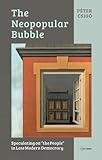The Neopopular Bubble : Speculating on "the People" in Late Modern Democracy / Péter Csigó.
Material type: TextPublisher: Budapest ; New York : Central European University Press, [2017]Copyright date: ©2017Description: 1 online resource (426 p.)Content type:
TextPublisher: Budapest ; New York : Central European University Press, [2017]Copyright date: ©2017Description: 1 online resource (426 p.)Content type: - 9789633861684
- 321.8
- JC423 .C773 2016
- online - DeGruyter
| Item type | Current library | Call number | URL | Status | Notes | Barcode | |
|---|---|---|---|---|---|---|---|
 eBook
eBook
|
Biblioteca "Angelicum" Pont. Univ. S.Tommaso d'Aquino Nuvola online | online - DeGruyter (Browse shelf(Opens below)) | Online access | Not for loan (Accesso limitato) | Accesso per gli utenti autorizzati / Access for authorized users | (dgr)9789633861684 |
Frontmatter -- Table of Contents -- Table of Contents -- List of Online Appendices -- Acknowledgments -- Introduction: Collective Speculation in Mediatized Populist Democracy -- Part 1 The Speculative Media System -- 1. Speculation and Liquidity in Mediatized Politics and Marketized Finance -- 2. The Rise of the Fifth Estate -- 3. Theorizing Collective Mythmaking on Media and Markets -- Part 2. The Cultural Autonomy of Neopopular Mythmaking -- Introduction to Part 2 -- 4. Mythicizing Popular Media in Academia -- 5. The Myth of “Active Control” in Media-Interpreting Industries -- Part 3. The Counterperformativity of Neopopular Mythmaking -- Introduction to Part 3 -- 6. When Being Popular Is Dangerous: The Case of a Myth- Driven Political Campaign -- 7. Latent Events in a Postnormal Media Environment -- Conclusion: The Dialectic of Liquid Modernity and the Crisis of Democracy -- Appendix -- References -- Index
restricted access online access with authorization star
http://purl.org/coar/access_right/c_16ec
The common critique of media- and ratings-driven politics envisions democracy falling hostage to a popularity contest. By contrast, the following book reconceives politics as a speculative Keynesian beauty contest that alienates itself from the popular audience it ceaselessly targets. Political actors unknowingly lean on collective beliefs about the popular expectations they seek to gratify, and thus do not follow popular public opinion as it is, but popular public opinion about popular public opinion. This book unravels how collective discourses on “the popular” have taken the role of intermediary between political elites and electorates. The shift has been driven by the idea of “liquid control:” that postindustrial electorates should be reached through flexibly designed media campaigns based on a complete understanding of their media-immersed lives. Such a complex representation of popular electorates, actors have believed, cannot be secured by rigid bureaucratic parties, but has to be distilled from the collective wisdom of the crowd of consultants, pollsters, journalists and pundits commenting on the political process. The mediatization of political representation has run a strikingly similar trajectory to the marketization of capital allocation in finance: starting from a rejection of bureaucratic control, promising a more “liquid” alternative, attempting to detect a collective wisdom (of/about “the markets” and “the people”), and ending up in self-driven spirals of collective speculation.
Mode of access: Internet via World Wide Web.
In English.
Description based on online resource; title from PDF title page (publisher's Web site, viewed 27. Jan 2023)


